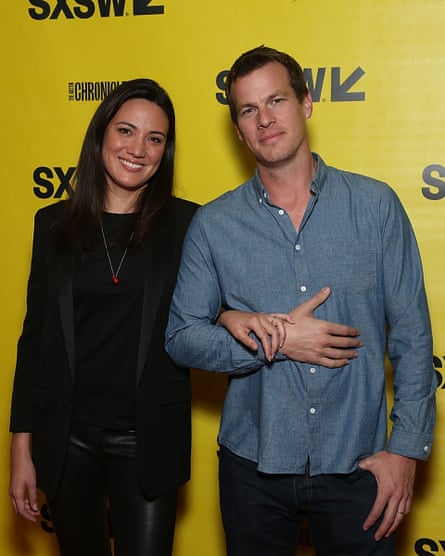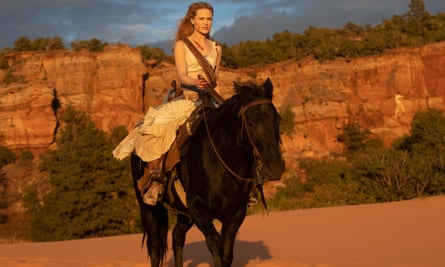Westworld, the sci-fi drama set in a theme park where human guests get to do what they like with a cast of robot cowboys, came to the end of a second season last night. The show has already been recommissioned for a third and has been an internet sensation, if not entirely a ratings one, for creators Lisa Joy and Jonathan “Jonah” Nolan. Mixing sex and violence with profound, almost mind-boggling discourse on the nature of reality, Westworld is a unique proposition and a product of this married couple’s appetite for intellectual debate.
“I think the show is the venn diagram of the things that we’re interested in,” says Nolan, the brother and frequent collaborator of director Christopher. “It’s one of the reasons why we couldn’t resist it in the first place.”

During the first season, the nature of artificial intelligence and its distinction from human experience was a consistent theme. In season two the focus has moved to the topic of immortality. In both, says Joy, the behaviour of the drama’s robot “hosts” – programmed to serve but often more human than the guests themselves – plays out the real-world debates the couple share between themselves.
“Our personal thoughts absolutely come in to play,” she says. “It’s why, when we discuss the philosophy of the show, we allow room for people to disagree. Even the hosts within the show disagree, right? Maeve [played by Thandie Newton] has one idea of what happily ever after looks like and it’s not in this corporeal world. [Evan Rachel Wood’s] Dolores has a totally different idea, that this world is all that matters. Don’t think about another world. focus on this one. Those ideas are paralleled in all sorts of ways in actual society. I would say that, between us, I tend to be a little bit more philosophically optimistic. Jonah,” she takes a long pause here, “I think he sees things as more finite.”
Nolan elaborates further. “This show is a composite of the things we’re interested in but the fault lines aren’t quite where you’d expect”, he says. “We take turns writing the characters and their different views. I’d say that my world view is slightly more misanthropic, but that changes daily as well. If I stop watching the news I gather a tiny, fragile thread of faith in humanity.”
Joy and Nolan met in 2000, at the premiere of Memento, the Christopher Nolan film adapted from Jonah’s short story. The younger brother was not even 25 at the time, while Joy was a graduate of Harvard law school. Over the years the pair have built lengthy CVs as screenwriters. Joy has worked on shows such as Burn Notice and Pushing Daisies (while also practising as a lawyer), while Jonah, as well as collaborating with his brother on blockbuster cinematic projects, created the drama Person of Interest. Westworld is the pair’s first venture together and their first time as “showrunners”. In the four years they have been working on the series they have also had two children.
This, then, is not your average couple. In researching Westworld, Nolan and Joy have explored the full cavalcade of Californian utopian thought. They have entered virtual worlds. They discussed the capacity of the human mind with neurobiologists (which, says Nolan, is roughly the equivalent of all the computing power available in the world right now, but something that might fit on a desktop computer in 30 years). As a counterpoint they met with gut biologists who argue the human body is an ecosystem and the lower intestine just as important in defining who we are as the brain. “I thought it sounded kind of new-agey at first,” says Joy, “but these were actual scientists not just Californian dieticians.”

It is tempting to see Westworld as the means through which Joy and Nolan are not only debating ideas but trying to puzzle out their own feelings on what it means to live and to die. This might help to explain why the show sometimes becomes so full of theorising that it almost collapses under its own brainy weight.
The show revels in wrong-footing fans, throwing in twists and nuggets of mythology that are dissected gleefully by fans on Reddit. In a broader sense, it has looked to subtly shift perceptions of who to root for in terms of man and machine. It is an ongoing tug of war that has been complicated further by some of the developments of the show’s second season.
“We saw some of the heroes stumble,” Joy says. “They made sacrifices that they may have found unconscionable before, but the exigencies of the circumstances changed what once was absolute morality into something more subjective. So I think we’ll continue to play with sympathies throughout.”

Another topic Westworld has wrestled with in its second run is man’s quest to live for ever. Joy admits to knowing people who are “quite obsessed with immortality” but says it’s not for her. “I personally am not so obsessed about immortality for myself,” she says. “The human body has been designed that way, obsolescence is OK. You have kids and you don’t want to hog all the resources.”
Nolan, meanwhile, claims to see both sides. He defines the digitisation of the human self as a “technical problem”, one that could be fixed in his lifetime. Would he choose to live for ever if he could? “It’s facile to say no, but it’s difficult right? You think about all the incredible beauty that’s been lost over the years. Then you think about all the people in the world we’re just better off without. It does feel like the inherent nature of humanity is the churn; we come, we have our time, and then we piss off.”
It sounds like a line of dialogue from the show, perhaps one delivered by the theme park’s sweary English “head of narrative” Lee Sizemore. And it also comes with a kicker. “So I think,” Nolan says in conclusion, “that death has been very useful.”

Comments (…)
Sign in or create your Guardian account to join the discussion